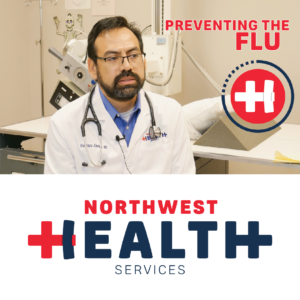
Francisco Alemán, MD, a physician at Northwest Health Services South Side Health Center, answers common questions related to this years’ flu outbreak.
To watch this interview, click here: https://www.youtube.com/watch?v=Hqtg7XbA9XI
Flu is awful right now. It’s rampant and for the lucky ones, they have the survival habits of Rick Grimes. This years’ flu has taken over, if you’re not sick, then you know someone who is.
The flu is so dreadful that The Centers for Disease Control and Prevention has postponed their session on nuclear attack preparedness to focus on the flu, citing the spike in flu cases around the country.
“To date, this influenza season is notable for the sheer volume of flu that most of the United States is seeing at the same time which can stress health systems,” according to a CDC statement.”
Health centers, clinics and hospitals are packed with flu patients and even some states like Alabama have declared a public health emergency due to the flu outbreaks.
Why is the flu so bad this season? What can you do about it? Here’s what you should know.
Why this flu season is so bad.
Different strains of the flu go around every year, four to be exact. A,B, C and D with seasonal flu being caused by A and B. This year influenza A is especially prevalent, which causes more health complications and is more difficult to prevent. Simply put this strain of the flu is harder to prevent and generally more putrid.
What can you do about it?
Getting the flu shot and staying home if you’re sick are two of the most important ways to reduce giving the flu to someone else. As far as prevention is concerned, it’s important to wash you hands, cover you mouth when you cough or sneeze and wipe down surfaces that have come in contact with the flu. A good rule of thumb is to stay away from those more susceptible to the virus like kiddos under five years of age or those over 65 years of age.
Oh, and get the flu shot!
If you haven’t received your flu shot, it’s a good idea to get it anyway, sometimes the flu season can last into May. Generally speaking, you have 2-3 months of flu risk and although vaccines aren’t 100% effective, a smaller percent is better than no percent.
In the meantime, wash your hands, cover your mouth and stay home if you’re sick. You can always come see us if you’re feeling under the weather.
